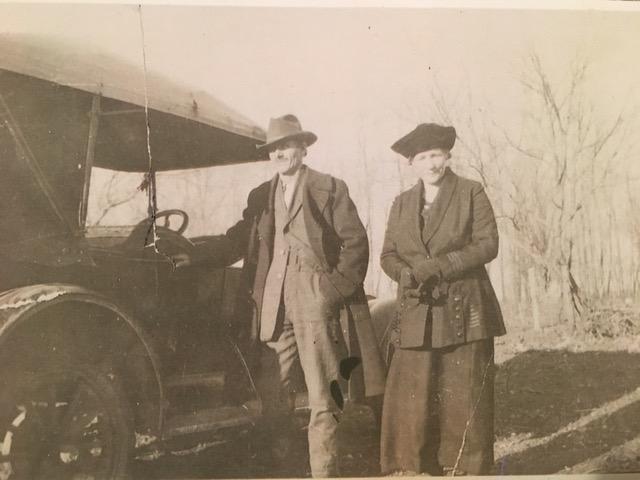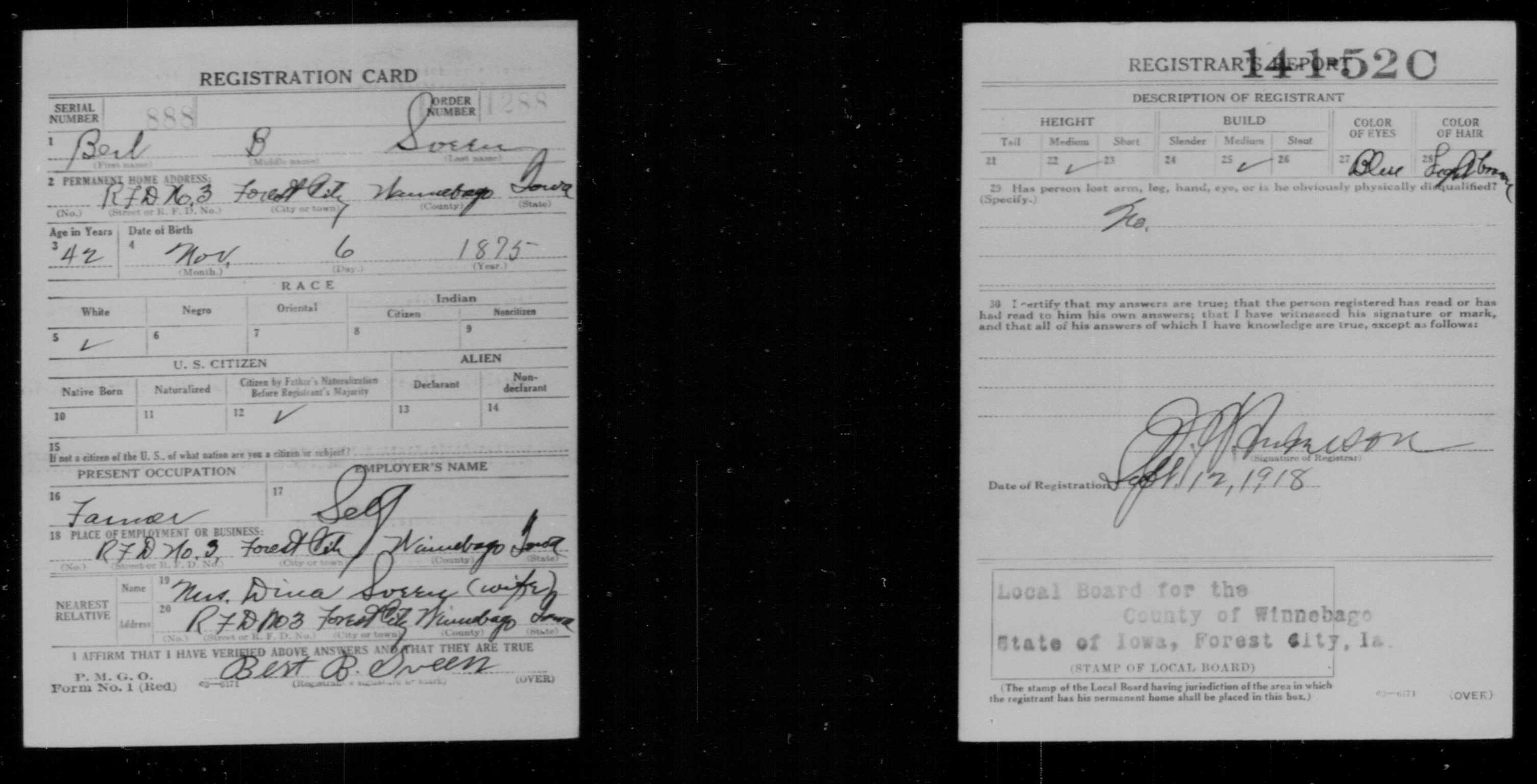The is a snapshot of one of my four great-grandfathers in 1917-1918. I wrote it upon my discovery online of their WWI draft registration cards.
The others are:
- Post-368: Great Grandfather No.1 [FFF] before draft board, 1917
- Post-369: Great Grandfather No.2 [FMF] before draft board, 1917 (this post)
- Post-370: Great Grandfather No.3 [MFF] before draft board, 1917
- Post-371: Great Grandfather No.4 [MMF] before draft board, 1917
I transcribe the cards below and provide some comments on how the war period turned out for each man. I think I can re-create, with a degree of reliability, a lot of what they were like and how they would have likely stood on the war. Some things I do not know and will pose them as questions. While I never knew any of them, I did now their children in their old age (my grandparents).
A native of Norway but in Iowa from about age 6 in the early 1880s; Farmer. Although over 40 when the US entered the war in April 1917 and thus not subject to the first call up, he was required to register in 1918. This card was submitted when he appeared before the draft board of Winnebago County, Iowa:
Registration Card
1. Name: Bert B. Sveen
2. Permanent Home Address: RFD No. 3, [i.e., rural area near] Forest City, Winnebago [County], Iowa
3. Age in Years: 42
4. Date of Birth: 1875
– Race: White
– U.S. Citizen[ship]: Citizen by father’s naturalization before registrant’s majority
– Present occupation: Farmer
– Employer’s name: Self
– Nearest relative: Mrs. Dina Sveen (wife) at RFD No. 3, Forest City, Winnebago [County], Iowa“I affirm that I have verified above answers and that they are true,”
[Signed, Bert B. Sveen]
Registrar’s Report: Description of Registrant
– Height: Medium
– Build: Medium
– Color of Eyes: Blue
– Color of Hair: Light Brown
– Has this person lost arm, leg, hand, eye, or is he obviously physically disqualified (Specify.): No
I certify that my answers are true; that the person registered has read or has read to him his own answers; that I have witnessed his signature or mark; and that all of his answers of which I have knowledge are true, except as follows: [Blank]
[Signed by the Registrar of Winnebago County, Iowa]
Date of Registration: Sept. 12, 1918

Bert Sveen [1875-1966] was not drafted and did not serve in World War I.
Why was he not drafted? What was going on in his life in the 1910s? What would have been his position on intervention in the 1914-1918 war?
He was only subject to mandatory registration in September 1918. While the apparatus of state would not have known this when it planned the Sept. 1918 registration wave, the war was already winding down by this time, with Germany losing its ability to do anything but fight retreating actions across the Western Front.
Why wasn’t he registered in 1917 with the others? The June 1917 wave called in men ages 21 to 30: Bert was 41 and so was not among them. In 1918, it was decided to expand the registration process to men ages 18 to 45, which then included him. He would never have been high on the priority list anyway even if in the draftable age range due to his status as [1.] a farmer, and [2.] having many dependents (including my grandmother, then a small child), a lifetime total of about ten surviving children., the last of whom died in 2015 at age 95.
Life Situation in 1910s and Family Origins
Bert Sveen was a farmer and of Norwegian farmer stock. When the curious war broke out in Europe in August 1914, he had been married to his wife Dina (or Dena) [1880-1947] for twelve years and had many children. Dina was not much of an English speaker, having arrived in the USA as a young adult circa the turn of the 20th century. Both she and Bert had ancestral origins in the Hedmark region of interior Norway, but Bert was a US resident for over 90% of his life.
According to my uncle’s research, Bert’s birth name in Norway was Børre B. Sveen; I think he exclusively used “Bert” in the USA, which was his home from age 7 or so in the early 1880s. The “B.” middle initial in Borre B. Sveen was the patronymic Børreson, as his father [1832-1924] was also named Børre. Many/most of his U.S. descendants and other “Sveens” use the spelling “Swain” instead of Sveen (long to the minor consternation of my father, until he learned on a trip to Norway in his retirement that “Swain” is closer to the Norwegian pronunciation that what US-English speakers produce when they read “Sveen.” So which is more authentic?). I notice Bert himself used Sveen on his own draft-registration card.
How would Bert Sveen have felt about the 1914-1918 war?
He would have likely been unenthusiastic, at best, at the prospect of war against Germany during the debates on intervention between late 1914 and early 1917, typical of his class.
Of the 96 U.S. Senators, 82 voted ‘Yes’ on the war resolution in early April 1917, and 14 did not vote ‘Yes’ (six voted ‘No;’ eight abstained); One of the six Senators who boldly voted ‘No’ was Asle Gronna (R-ND) who was of Norwegian ancestry. A wiki editor says:
Gronna…reflected the attitudes of his region — progressive and isolationist.
Another wiki editor says this, citing a 1988 book called The Great Silent Majority: Missouri’s Resistance to World War I by a Christopher C. Gibbs:
Midwestern farmers generally opposed the war, especially those of German and Scandinavian descent. The Midwest became the stronghold of isolationism; other remote rural areas also saw no need for war.
I expect this probably describes the position of Bert Sveen.
If suspect my grandmother inherited her lifelong farmer-oriented Democratic politics from her father and that he fit this archetype. His home county, Winnebago, voted both for third-party Teddy Roosevelt in 1912 and third-party left-wing Wisconsin Senator Robert La Follette in 1924. The latter had, in 1917, said: “For our country to enter the European war would be treason to humanity,” which shows that locals were not party-machine types and rather willing to support ‘dissident’ politics, which I suspect applies to opposition to the war in the 1914-1917 period, especially when calls for intervention from above reached such heights by early 1917.
Signs thus point to Bert Sveen being likely representative of his class: anti-interventionist in the war and not enthusiastic about it at any point, though unlikely to be as bold as Senator La Follette in slamming the war.
Other posts in this series:
- Post-367: Portraits of four great-grandfathers as young men, in 1917-18, in front of U.S. draft boards
- Post-368: Great grandfather No.1 [FFF] before draft board, 1917
- Post-369: Great grandfather No.2 [FMF] before draft board, 1917 (this post)
- Post-370: Great grandfather No.3 [MFF] before draft board, 1917
- Post-371: Great grandfather No.4 [MMF] before draft board, 1917

